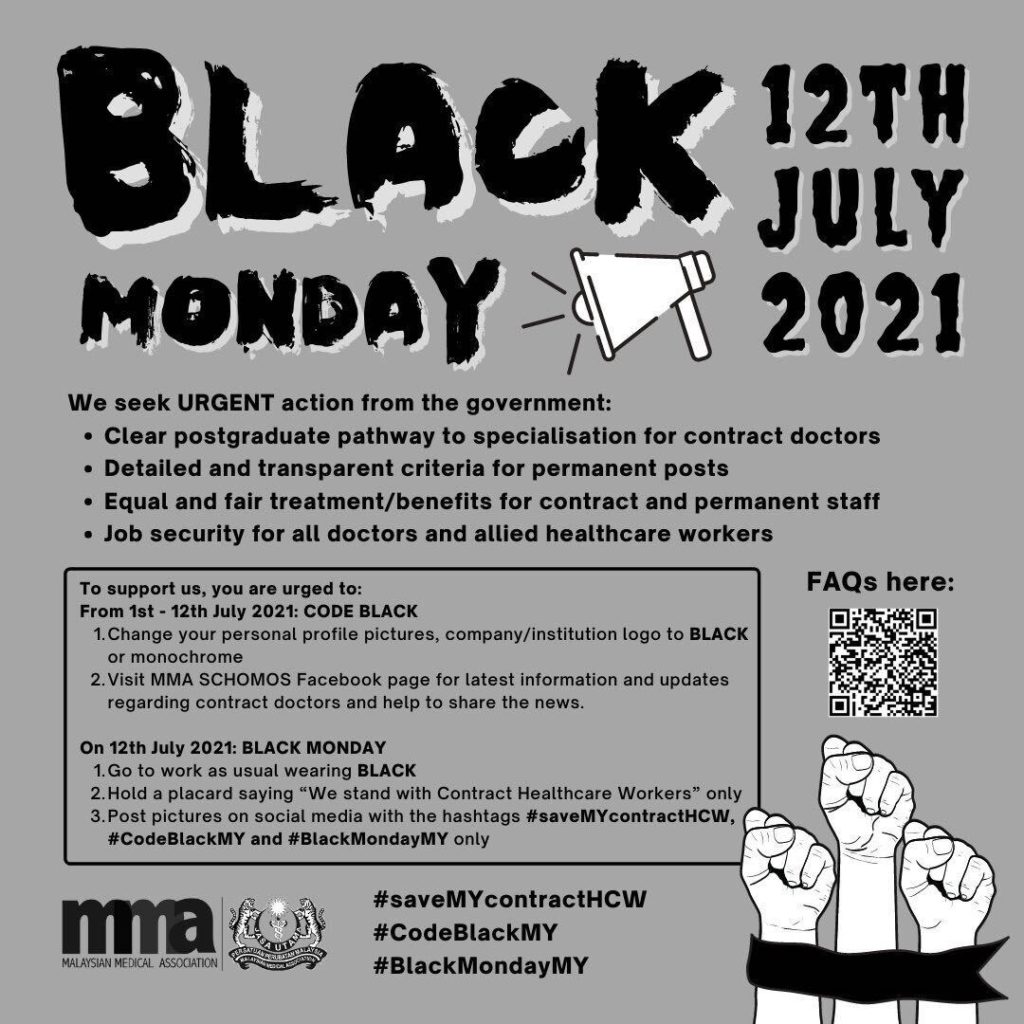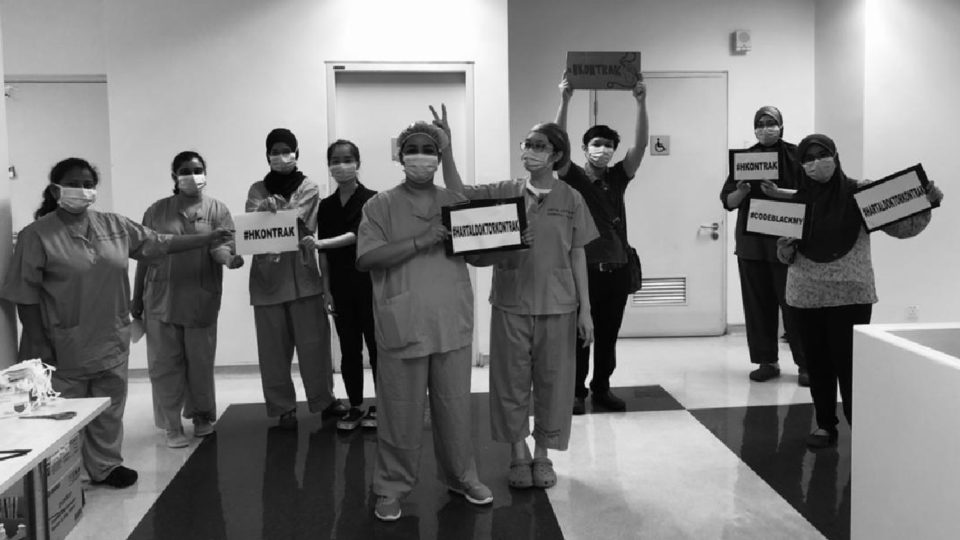Have you been seeing monochrome display pictures on social media lately?
Those people are supporting the #CodeBlackMY and #HartalDoktorKontrak online movements that call on doctors to dress in black on July 12 if the government does not address the unequal treatment of healthcare professionals on contract. They’re also planning a walkout later this month.
Led by the Malaysian Medical Association, or MMA, the campaign is seeking the government’s action on four issues:
- Clear the medical postgraduate pathway so that contract doctors can attain specialization
- Establish detailed and transparent criteria for full-time doctor positions
- Equal and fair treatment or benefits for both contract and full-time medical staff
- Job security for all doctors and allied healthcare workers
How did we come to this? That’s because we need doctors now more than ever during a health crisis like the coronavirus pandemic, and it’s not right to treat them unfairly – whether they are serving as a contract or full-time staff.
“It’s frustrating really. To be doing the same thing, having the same job scope as the permanent doctors but not getting the same benefits,” Dr. M, someone working as a contract Medical Officer, told Coconuts recently. Due to a gag order imposed by the government, all healthcare workers cannot be named by the media.
“And especially now during the pandemic. Most of the frontliners are my contract colleagues,” Dr M added.
A memorandum containing the demands of the movement was submitted to Health Minister Adham Baba, the Public Services Commission and the Chief Secretary of the Health Ministry, campaign spokesperson Mustapha Kamal said last week.
“The first cohort of contract doctors began their service in December 2016 and only 789 doctors (3.4%) have so far secured permanent positions,” he said. “So far, there has been no blueprint on the career progression for contract doctors. We do not even know what the selection criteria for a permanent placement is.”
He added: “Our contracts will end this December. Despite five years of waiting, our fate still remains unknown without any assurance to be absorbed into the public healthcare system.”

Career advancement obstacles
The unequal treatment of contract doctors began when the government introduced the idea of placing apprentice doctors as contract workers in 2016, making it difficult for them to become full-time medical specialists within 10 years of training, and causing many to end up doing the same tasks as a full-time doctor while being excluded from employee benefits and rights.
Before the new plan was in place, Malaysian doctors originally spent five years studying in medical school followed by two years of training as a House Officer, or HO, and another two years as a Medical Officer, or MO, before they go on to complete a masters’ course paid by the government and become full-fledged medical specialists. The government’s decision to change this risked job security for doctors, some of whom can never be sure when they will ever be converted to permanent staff. The opportunity to be a medical specialist also hangs in the balance.
No matter how good you are, there is no transparency in the permanent doctor position selection process, Dr. M said, adding that contract doctors also struggle with the stigma of not being good enough because they have not attained a specialization.
The roadblocks don’t end there. Contract doctors who want to become medical specialists would need to pay for their own masters’ or parallel exams instead of having them funded by the government. Even if they pass, they would need to be gazetted by the Health Ministry.
In other words, “even if we pass the papers, without proper training and experience, we still can’t be specialists,” Dr. M said.
The Health Ministry had on June 23 defended the contract-based recruitment, saying that it would allow new doctors to be appointed despite the limited number of permanent vacancies available. Health Minister Adham also called for calm, adding that a cabinet paper was being prepared and would be tabled in parliament soon.

The future of medical specialists in Malaysia
If the current situation doesn’t change, it looks like Malaysia will be on track to having fewer medical specialists in the future since it is so difficult for contract medical officers to advance their careers. But will the government be financially ready to hire specialists from abroad? Not surprisingly, junior doctors want to move on to greener pastures, including looking outside of the medical field, Dr. M said.
The COVID-19 health crisis in Malaysia is already burdening hospitals suffering from a lack of doctors. With Putrajaya’s refusal to increase the number of permanent positions, the Malaysian Health Coalition said that the contract system is akin to treating healthcare professionals as expendable assets.
MMA gave the government three weeks to meet the demands of the campaign or risk seeing a walkout on July 26. The 24-hour nationwide strike will see patients left under the care of senior doctors. Mustapha said that the doctors intending to walk out have already lawyered up in case of any disciplinary actions. MOs participating in the labor strike may risk being terminated.
Other stories:
‘Will numbers go down?’: Malaysians furious at heightened restrictions, 8pm curfew
Malaysian hospital uses ultrasound device to detect COVID-19




